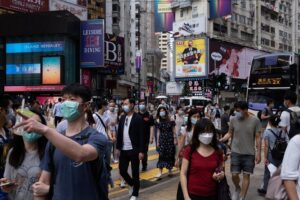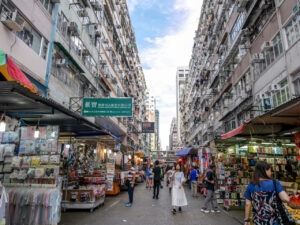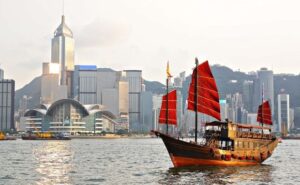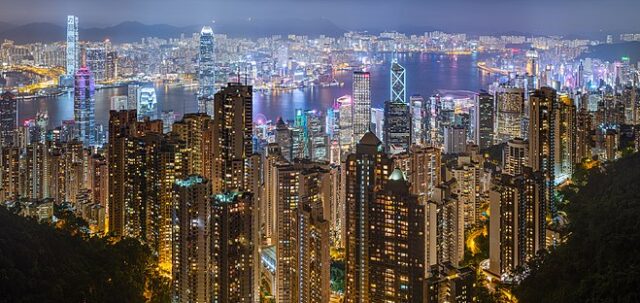For the past three years this question has lingered on the minds of many of us, is it the right time to pack our bags and move on? Our columnist Virendra Anand argues that the answer varies, depending on the demographic of whom you ask.
Let us look at what has happened over the past three years which has led to so much uncertainty and anxiety. It started with the protests, leading to the disruption of daily lives for many. Tourism took a big hit and many in the food and beverage sectors, airlines, and hotels have reached a point of no return. For the ethnic Indian community in particular, many worked in the retail business, some in tailoring and textiles, others in transportation, and were largely dependent on tourism.
As this story goes to press, the South China Morning Post (SCMP) reported that over 50,000 people departed Hong Kong in the first half of March 2022.While it is hard to project how many of those leaving were of Indian origin or if they left temporarily, the numbers and scenes at the airport departure lounges do create an alarm. Many may have only gone temporarily out of a fear of rising cases and a worry of children and parents being separated in isolation. Still others left as non-international schools shut early and many international schools allowed their faculty members to teach online from overseas. Those of us who found the prospect of moving out impractical have had to improvise and reinvent ourselves.
Throughout the crises, this city kept fighting and those with the ‘can do’ spirit have kept soldiering on. With formidable and enviable reserves, free healthcare, decent GDP per capita, low taxes, good level of personal security and excellent infrastructure, it was always going to be a tough choice for anyone considering whether to stay or relocate. Let us look closely at what might just tip the balance.
What Hong Kong Offers?

There is a certain buzz which Hong Kong offers that very few places do on the planet.
It is the soul and essence of what the city is. You can wake up on a weekend and make impromptu plans to go for a hike, swim on a beach or be out cycling with friends. And you can do most of this using public transport. You can be out fine dining on a Saturday night in your finest clothes and then meet friends for dai pai dong noodles on a Sunday lunch in shorts and flip flops. No one judges you.
Children of multi millionaires and kids from a government housing estate can use the same world class pools and sports facilities for a nominal fee. And how many places in the world will you see a celebrity being served at a roadside food stall?
After all, just look at some key statistics. Hong Kong and Singapore rank number one in the average IQ of 108 for citizens, showing a massive pool of capable manpower. Hong Kong, Singapore, Macau, China and Estonia make up the top 5 in OECD PISA rankings for school students, showing a robust education system. Many Hong Kong universities are in the top 100 of the World in the Global QS rankings far ahead of counterparts in Australia and New Zealand. Hong Kong leads the world in life expectancy for males and females, demonstrating an excellent primary health care infrastructure.
One thing to note about Hong Kong is that despite the protests of many about wealth being accumulated by a select few, it does give an equal opportunity to those who have the stamina and skill. All you need to do is to look at the top fifty wealthiest in the city. While many tycoons of today may be seen as holding disproportionate wealth compared to other citizens, most were not born into wealth. They came as immigrants and created it in the past few decades, which needs to be acknowledged. The most prominent first generation expat example is self made billionaire, Harry Banga, a very active member of the Indian community and a role model for many. Being successful does not necessarily mean financial success. Many ethnic Indians hold key positions in other institutions in Hong Kong too, be it universities, healthcare or the legal profession. In terms of opportunity, very few places offer such opportunities. Self made billionaire Alan Zeman who changed his Canadian citizenship for a Hong Kong passport quite simply has this to say ‘There is no better place’.
How 2020 changed things?
 However, just as we were just getting our act together after the 2019 protests, the pandemic blindsided us. While Hong Kong managed the initial health outbreak of the pandemic extremely well with a low fatality rate, it was unable to motivate the majority of the population to get vaccinated. Low infection rates and never having to endure a real lockdown lulled everyone into a false sense of security. The zero Covid strategy and stringent no visitor policy started taking a toll. Many expats with families back in their native countries, or children in universities abroad, found it hard to balance the benefits of being here against normal family life. To commit to a 3 week quarantine in Hong Kong coupled with a 1 or 2 week quarantine in the country you were visiting, was enough to take a massive mental and financial toll on many.
However, just as we were just getting our act together after the 2019 protests, the pandemic blindsided us. While Hong Kong managed the initial health outbreak of the pandemic extremely well with a low fatality rate, it was unable to motivate the majority of the population to get vaccinated. Low infection rates and never having to endure a real lockdown lulled everyone into a false sense of security. The zero Covid strategy and stringent no visitor policy started taking a toll. Many expats with families back in their native countries, or children in universities abroad, found it hard to balance the benefits of being here against normal family life. To commit to a 3 week quarantine in Hong Kong coupled with a 1 or 2 week quarantine in the country you were visiting, was enough to take a massive mental and financial toll on many.
Hong Kong has since reduced the quarantine period to one week for vaccinated residents, but still imposes some of the most stringent entry requirements. Frequent flight bans and policy reversals make travel too risky a prospect for many. The apparent expat population exodus (while maybe temporary) is not just isolated to Hong Kong. Singapore seems to be going through its own drastic changes, with the lowest number of expats since 2010 after a 9% drop in expat numbers for the year closing December 2021. India too has not been spared. The pandemic situation in India led to a sudden increase in HNWIs (High Net Worth Individuals) getting overseas residencies. Dubai on the other hand, went the other way trying to ease rules for new arrivals to attract talent and investments. It is now jokingly referred to as India’s most modern city ever since its 10 year residency visa became much easier to obtain.
In terms of work, many salaried people have had to take pay cuts, ranging from small to drastic ones. Many others have lost their jobs. Businesses found it hard to stay afloat as end clients overseas found alternatives to their suppliers’ prolonged lockdowns. The Hong Kong government has come up with a few incentives for companies to retain staff, and for businesses to receive assistance, but these short term handouts will not be able to replace what makes the city tick. And what makes Hong Kong tick is tourism and the energy of the people. It is important to retain talent, recharge the workforce with hope. One key factor for this will be the complete elimination of the quarantine requirements, along with loosening borders controls for visitors and business people. Hong Kong is an international trade center and needs a constant flow of people to function efficiently. Let us hope this happens soon, so that vitality can be revived in this city again.
Should we stay or go?
 So we go back to the question at the start of the piece; should we stay or go? No single answer will fit all.
So we go back to the question at the start of the piece; should we stay or go? No single answer will fit all.
Are you self employed or are you salaried? Those who are self employed may find it hard to adapt in other places. Salaried people with professional qualifications, however, find their skills can be transported to other places with greater ease.
Are your children young, teenagers or in University? Families with very young kids or children in overseas universities will probably find relocating easier.
How old are you? Many from the subcontinent feel that expat life can assist in educating kids in overseas universities before retiring in their native places.
Are your parents old and need help or are there other siblings to look after the elderly back home? As people from the Indian subcontinent tend to have stronger ties to their extended families, those with elderly members feel a sense of guilt and responsibility if they are unable to meet their parents regularly.
And of course, the most important part, is Hong Kong your home?
With astronomical rents you can feel like an outsider on borrowed time if you are out of work but if you own your own home, you have a sense of belonging and a lower threshold of living costs.
Talking to a few Indians living in large communities in areas like Lohas Park, Tung Chung, and Laguna, one gets the impression that nothing has really changed in terms of immediate plans to move. But when probed about options, the things they mention most about their future abode are a sense of community which is very important, cost of living, Medical facilities, availability of domestic help, an under 6 hour travel time to your native country and language. Thailand, Dubai, Indonesia seem to tick a lot of boxes for many. The relocation options could be based on which passport you hold irrespective of your ethnicity too as it usually means complex visa procedures and unless you are relocating back to your native country, it can be a crucial factor in decision making.
I find the overall mood of many local people not very different from the anxiety after the 1989 crackdown, 1997 handover, SARS, and the financial crisis. Many people left, others replaced them. Many established themselves overseas with Australian, New Zealand or Canadian passports but then came back as the temptation was too hard to resist. Some found comfort in their new abode overseas. Many still regret leaving. Properties crashed then but are back to pre-protest levels despite a raging pandemic. In the end no one was indispensable and the city flourished. A polarized external press portraying various doomsday scenarios does not help as it subconsciously changes perception and opinion. One key pointer to get an idea for people on the move is through children who tell you about classmates on the move and property agents leasing homes. Yet another crucial denominator is the MPF. The government reported that a record 2.6 billion was withdrawn from the MPF accounts even though the number of people withdrawing was 9300 in the past few months against the backdrop of a declared 50000 leaving. We therefore need the dust to settle till the summer school holidays to get a realistic idea on the break up of people on the move.
In the end it is about staying power. If you own a home, have some savings, it is likely you will ride out the storm and be part of the wave when things are on the upswing. If you are eating up your savings, have a base back home and face an uncertain future here, it’s probably wise to make a temporary or permanent move depending on your age, future choices of the rest of the family. The local government has been very generous in its immigration policy with many Indian families having sponsored aging parents domiciled in their home country to get dependent ID cards which allow them free travel and healthcare facilities in Hong Kong. Small gestures we take for granted.
So while the pessimists say the city is doomed, the optimists see the Greater Bay area as one of opportunity with 75 million people waiting to trade. It’s a case of the glass being half full or half empty. We have many friends who are die hard fans of the city with no desire to move or relocate as they are too used to their way of life here. Looking at the demographic of 18,500 Indian students in Ukraine, 23,000 in China and 16,000 in Russia alone, it makes you proud to see how the 36 million strong Indian diaspora has established its soft power across the globe. Despite all the shortcomings, my family would find it extremely hard to adapt to a different environment than what we have become accustomed to. Waking up to birds chirping in the garden in our tiny village house overlooking the Silverstrand bay makes us feel grateful for what the city and people of Hong Kong have given us. Luckily my work in the construction industry has been largely unaffected by the events of the past three years but my wife who runs a prominent Indian private kitchen has had to suspend operations several times. For me, my soul will always be in Delhi but my heart is in Hong Kong.
The number of expatriate white-collar workers in Singapore fell to the lowest in more than a decade dropping 9% to 161700 in the year end Dec 2021. [SCMP 16th March 2022] Even as international borders remained largely shut in 2020 and 2021 as the result of the Covid-19 pandemic, Henley & Partners saw a record 62 percent increase in enquiries for investment-based immigration from Indian clients in 2020, and 30 percent higher in the first five months of 2021 “In the last few years, ever since the pandemic hit we have seen a 50% increase in enquiries from the Indian Citizens. The HNI’s and UHNI’s are reaching out to look for different options like Portugal, Greece and the Caribbean Islands in addition to the firm favourites UK, US and Canada.” Shalini Lambah Chief Executive (india) Migrate World





